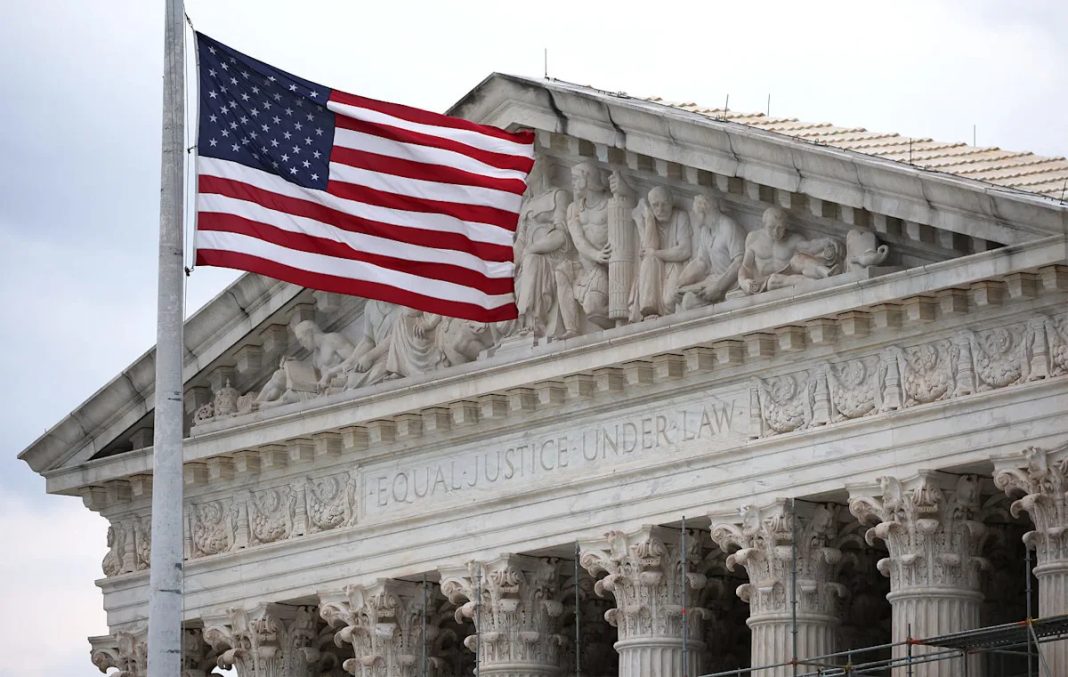Welcome back, Deadline: Legal Newsletter readers. The Supreme Court’s first two-week hearing session of the term is in the books, capped off by Wednesday’s oral arguments that signaled further erosion of the landmark Voting Rights Act. The justices also rejected Alex Jones’ bid to upend his defamation judgment, and the Republican-appointed majority continued to greenlight executions over Democratic-appointed dissent.
Jones is still on the hook for the $1.4 billion judgment, which he called “the largest in American libel history,” because the court declined to hear the case stemming from his lies about the 2012 massacre at Sandy Hook Elementary School in Connecticut. The Infowars host’s rejection was one of many on the court’s routine order list Tuesday morning (where the court likewise denied Ghislaine Maxwell’s petition last week).
No justices voiced any dissent from the Jones denial, but the left and right flanks of the court each spoke out in connection with two other rejections, in a contrast that provides a good snapshot of the Roberts Court. In one of the cases denied review on Tuesday’s list, Justice Samuel Alito wrote a statement joined by Justices Clarence Thomas and Neil Gorsuch, in an appeal over parental rights and schools supporting students’ gender transitions without parental knowledge or consent. Though the three GOP appointees agreed for procedural reasons that the petition wasn’t ripe for review, Alito wrote that the “troubling — and tragic — allegations in this case underscore the ‘great and growing national importance’ of the question that these parent petitioners present.”
A different view of tragedy came from the Democratic appointees, with Justice Sonia Sotomayor leading the way in a dissent in a death penalty case. Writing for herself and Justices Elena Kagan and Ketanji Brown Jackson, the Obama appointee lamented her colleagues’ refusal to address what they saw as an obvious injustice, writing: “Tragically, the Court denies review instead, allowing a death sentence tainted by a single juror’s extraordinary misconduct to stand.”
That death penalty theme continued in another case this week, in which the Republican-appointed majority declined to halt an execution despite the defendant raising what Sotomayor, Kagan and Jackson deemed an important constitutional question. That led Sotomayor to write that the majority “abandons its duty” in declining to step in, “even though a man’s life is in the balance.” The majority had nothing to say for itself in response, instead denying the stay without explanation in the latest shadow docket outing.
The majority had a lot to say at a key voting rights hearing on Wednesday, and what they had to say seemed to foreshadow the court’s latest weakening of the Voting Rights Act. Justice Brett Kavanaugh, who holds a pivotal vote in the dispute from Louisiana that could benefit congressional Republicans’ redistricting efforts, aired his view that race-based remedies in the law must have some sort of time limit — despite the fact that there’s no such limit in the law and constitutional amendments at issue.
“Pretty catastrophic” was how the lawyer arguing against that notion, the NAACP Legal Defense Fund’s Janai Nelson, described the impact if the court guts Section 2 of the Voting Rights Act. That section is what remains of the act after Chief Justice John Roberts and his conservative colleagues previously invalidated another key part of the 1965 law that has been called “the crown jewel of civil rights legislation.” At Wednesday’s hearing, Nelson said that “any further neutering” of Section 2 “would resurrect the Fifteenth Amendment as a mere parchment promise.” Yet Kavanaugh, Roberts and company might be moving the law that way.
Trump’s tariffs will be the main event when the justices retake the bench for the two-week hearing session that starts Nov. 3. The pivotal tariffs hearing will take place Nov. 5, and the president said this week that he might attend himself.
As we head into the weekend, the Trump administration wants the justices to let the president deploy the National Guard in Chicago. Lower courts have blocked the effort thus far. So even though they are off the bench until next month, we could hear from the justices on the shadow docket in this case and any other urgent disputes that arise. The court is also set to issue an order list on Monday with the latest actions on pending petitions.
Have any questions or comments for me? Please submit them on this form for a chance to be featured in the Deadline: Legal Blog and newsletter.
This article was originally published on MSNBC.com

